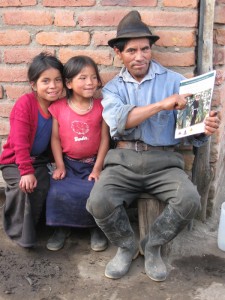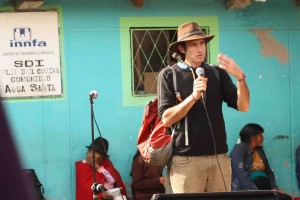The Council for Cultural and Biological Diversity, in Spanish known as Fundacion OSA, formerly Grupo Osanimi, is a collaborative effort among a small but growing group of concerned and aware individuals in Costa Rica, Ecuador and the United States in the fields of fundraising and proactively endorsing rainforest and wildlife conservation and cultural heritage revivification projects among Indigenous minorities and rural peoples’ communities. The work supports the struggle for cultural and territorial autonomy through land purchase programs and in the past via demarcation and decolonization programs.

Don Juan Sharing An Educational Magazine With The Local Youth
We have dedicated efforts to cultural heritage rekindling processes that includes participatory ethnobotanical and ethnographical field documentation and publication of this material in bilingual education booklets for local schools. It has also included the preservation of medicinal plant knowledge via workshops and educational council gatherings as well as the protection of the plants themselves in ethnobotanical gardens, in situ. Our work has always been in collaboration and support of traditional healers and their healing methods.
Among indigenous peoples communities our approach is holistic and direct in nature aimed at finding creative ways to bridging the gap among the generations in order to collaborate in the efforts of safeguarding the rainforest and the knowledge pertinent for continued sustainable living, healing and well being.
Our strategy addresses the specific needs of the region in which we work. In the Ecuadorian Amazon many of the Indigenous groups have obtained legal title to their communally held lands, which collectively amount to hundreds of thousand of acres of primary rainforest. The fact that these forest lands are held communally by Indigenous communities does not mean it is protected. The Indigenous People of the Amazon are faced with tremendous economic pressures at the same time that their traditional cultures are undergoing rapid change that follows modernization.
Unsustainable land-use, such as cattle and timber extraction, is rapidly becoming the main economic activity. Through our work in the region we have noticed that a crucial, yet often overlooked, link in preserving the forests is the practical knowledge of the uses and value of the forest inherited by the people of the rainforest. This knowledge is, regrettably, disappearing even faster than the forest itself.

Foundation Director Jonathon Speaking At A Community Gathering
It has been made clear and only after many years of experience, that when forest peoples communities maintain their plant lore, they also maintain respect for the forest and always have a communally held forest reserve. On the contrary, when the knowledge of the flora has been lost, the people practice unsustainable land use methods and are prone to clearing the entirety of their forest land holdings. For this reason and other reasons as well we believe in the importance of promoting cultural revivification and supporting Indigenous medicinal plant knowledge and healing modalities among indigenous peoples communities as an effective strategy towards supporting the protection of fragile rainforest eco-systems and the good health off the people themselves.
Our projects are small steps towards the preservation of the tropical rainforests. We create ethnobotanical gardens and cultural centers for youth to study with the community elders. We publish small bilingual educational books based on traditional plant lore and its application. We also channel funding to purchase and establish forest preserves by partnering with Indigenous communities that have demonstrated a commitment to conservation.
With the acceleration of deforestation, forest cultures are now more vulnerable than ever. Greater financial resources would increase the effectiveness and outreach potential of our work – the effectiveness of existing projects and expand our ability to undertake new ones. We hope our work will inform and inspire you. To concerned individuals, foundations, and private benefactors, we express deep gratitude for your solidarity.
Staff
- Jonathon Sparrow Miller Weisberger – Director, Ethnobotanist
- Ladna Miller Weisberger – Vice President, Project coordinator in Ecuador
- Dahlia K. Miller – USA Liaison, Ph.D. Social & Cultural Anthropology
- Donna Runnals – Director Living Bridges Foundation
- Ricardo Alvarado – Legal advisor, Educator
- Nelson Jimenez – Municipality of Osa, Costa Rica
Costa Rican Projects
- Ethnobotany of the Osa Peninsula
- Marine turtle conservation on San Josecito Beach
- Ethnobotanical teaching center
Ecuador Projects
- Llushin River Rainforest Conservation Project with the Amazanga community.
- Ethnobotanical studies and cultural heritage projects among the Secoya
- Land acquisition and agricultural project with Highland Andean Quichua
International Advisory Council
- Alex Rubin – Director, Tropical Rainforest Coalition, USA
- Victorio Villareal Villareal – Herbologist; Osa Peninsula, Costa Rica
- Don Pablo Amaringo – Artist and Director of Usko Ayar School of Amazonian Painting; Pucallpa, Perú
- Dennis McKenna, Ph.D. – Director of Ethnopharmacology Heffter Research Institute and author; USA
- Lisa Faithorn – Anthropologist, organizational consultant, deep ecologist; USA
- Vernice Solimar – Professor & Chair of Department of Consciousness Studies, John F. Kennedy University; USA
- Rudolf W. Becking – Professor Emeritus, Natural Resources & Forestry, Humboldt State University; USA
- Bruce Harlow – Alternative Technology technician; USA
- Leonard Weisberger – Artist; USA

